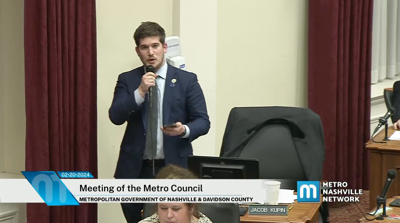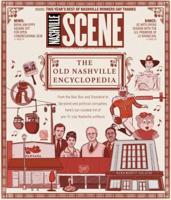@startleseasily is a fervent observer of the Metro government's comings and goings. In this column, "On First Reading," she'll recap the bimonthly Metro Council meetings and provide her analysis. You can find her in the pew in the corner by the mic, ready to give public comment on whichever items stir her passions. Follow her on Twitter here.
Bill Purcell waved as he ducked out of the gallery partway through Tuesday night’s Metro Council meeting. “Good luck!” he said, before making a quiet exit.
The former mayor — maybe the last mayor everyone seemed to actually like — was there to lead his class of Vanderbilt public policy students in some councilwatching. As if by magic, the meeting ended shortly after he imparted his well wishes.
Purcell still has sway in the courthouse.
Councilmanic Courtesy
Perhaps the presence of a revered public servant and a gaggle of college kids had a calming effect on the council. Or maybe the Nazis marching through downtown Nashville over the weekend reminded councilmembers that it is not, in fact, the end of the world when a colleague introduces some legislation you don’t support.
For whatever reason, after a remarkably nasty meeting earlier this month, the councilmembers were on their best-ish behavior Tuesday night. There were disagreements, sure, but the debate was largely subdued and issues-based.
Tempers briefly flared over a bill to rewrite portions of the zoning code regarding lot sizes in subdivisions. Termed “compact development,” the new provisions would allow developers of subdivisions to have varied lot sizes, with some smaller than what would typically be allowed, in exchange for setting aside a certain percentage of the total subdivision for open space.
Councilmember At-Large Quin Evans Segall — quickly becoming the most despised woman on the council thanks to her attempts to reform our 26-year-old zoning code — proposed an amendment that would’ve provided an additional incentive for developers to provide public open space.
The bill in its current form contemplates that public open space could be an option, but it provides no additional incentive for developers to work through the arduous process of coordinating a donation of land for use by the public. Given the choice between what’s best for the general public (open space accessible to all of us) and what’s easiest to get approved (open space accessible just to the people in your subdivision), I think I can guess which path most developers will take.
After some hand-wringing, the council rejected Evans Segall’s amendment, with only 11 members voting in favor.
It’s clear there are still hurt feelings over Evans Segall’s introduction of a slew of proposed zoning reforms at the last meeting. One councilmember, who called the amendment a “no-brainer,” said Evans Segall’s sponsorship was the kiss of death. I’m not sure I believe it would’ve been approved, but I don’t think the defeat would’ve been quite so decisive.
Several councilmembers repeated a variation on a theme: We should abide by the recommendations of the Planning Commission and heed the advice of the Planning Department.
I just want y’all to bookmark this for when the Planning Commission ultimately puts their stamp of approval on wholesale zoning reform. I would be willing to bet money these Planning Defenders will be singing a different tune when that one comes up for a vote.
Capital Campaign
Mayor Freddie O’Connell’s first capital spending plan sailed through without changes. It totals roughly $514 million, with the lion’s share of investment going to Metro Nashville Public Schools and the Nashville Department of Transportation.
This is the first chance for O’Connell to really put his money where his mouth is. It’s hard to draw too many conclusions from this first spending plan, as departmental needs change over time, but O’Connell’s chosen investments are consistent with his campaign’s focus on basic city services.
Notably, O’Connell’s first CSP allocates more than $30 million to WeGo. That’s nearly half the total capital dollars former Mayor John Cooper invested in the city’s public transportation agency over his entire four years in office. Cooper’s lack of attention to WeGo was a consistent sore spot for O’Connell during his time on the council; recall, for instance, the Great Zoo Parking Garage Showdown of 2021.
Bad for Business
One of the longer “debates” of the evening wasn’t actually a debate. The council came together with one voice to unanimously support a resolution condemning the Nazis who marched our streets over the weekend.
Councilmember Jacob Kupin, a Jewish councilmember who represents downtown Nashville, sponsored the resolution, which reached members’ desks only hours before the meeting started.
“It’s important to meet the moment,” Kupin says, speaking about his decision to file the resolution on an expedited timeline. “I felt like we had a real opportunity to respond, and respond clearly.”
It’s worth watching all 20 minutes of floor speeches on this one. I’m not usually a fan of nonbinding resolutions, but displays of hate like the one we all witnessed over the weekend call for an exception to even the strictest of rules.
White supremacists continue to show up in Tennessee. Perhaps because they identify with our state leaders' politics.
Councilmember Jordan Huffman had to edit himself. He was riled up after a slew of hateful messages online. One commenter went so far as to call Huffman a “disappointment to the white race.” To the people who would seek to frighten him into silence, Huffman wanted to make sure he got one message across: “I’m a bald white man with a Southern accent. I directly threaten what they’re standing for, and I’m bad for business.”
Asked to elaborate on that statement, Huffman clarifies: “The fact that I look like them — it opens up other white men to think, ‘This shit’s wrong, and I can be an ally.’”
Councilmember Sheri Weiner recounted a shocking story from her childhood. “It was summer," Weiner said. "School was about to get out in 1964. I was 8 years old. And I didn’t make it to school that morning. Wanna know why? Because my neighbors down the street decided that they wanted to ‘stone the Jew girl.’”
Sixty years later, Weiner said, “We should not be here. We cannot be here.”
Friends, it should not take a visit from literal Nazis for us to realize we’re not each other’s enemies. I hope we can carry this spirit of togetherness for just a little while longer. It’s a good feeling.






